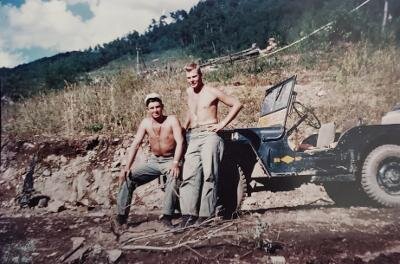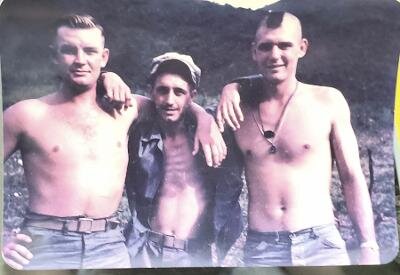Bill Gillen (USMC)
1st Marine Division, 1st Regiment, 1st Battalion, Abel Company, 2nd Platoon
Bill Gillen
Bill joined the Marine Corps Forces Reserve for two years from June 24, 1948 to June 4, 1950. He went home for two weeks, then the Korean War began. His dad had told him about Korea. Although Bill did not know much about Korea, he decided to go back and rejoin the Marine Corps Reserve and took a train to California. On August 16, 1950, the entire unit was activated and they were sent to Camp Pendleton.
Bill Gillen, USMC 1950
Usually boot camp is 16 weeks, but they trained for only 24 days and were told they were combat ready. They took a ship for two weeks and arrived in Kobe, Japan. After a month, they were sent to Korea on November, 24 1950, and were assigned to different companies. Two of his friends from Louisiana, Daniel Dallier, and John Fury, joined another company. On the way, their truck was ambushed and Dallier was killed on the first day of combat. His name is on the Korean War Memorial plaque. John Fury survived the war and passed away on November 23, 2018.
Bill and his company encountered one unit of Chinese and they had a firefight. “I thought everybody was shooting at me. That was the first time I was in combat! It was very scary.” They were at Chinhung-ni [south of the Chosin Reservoir]. Their mission was to climb hill 1081, which was the most dangerous of these hills. The hill needed to be cleared before the Marines could bypass it. They rode on the truck about a mile and half and walked to the base of the hill 1081, which was about 4000-ft. high. There were continuous fighting everyday and they had to climb different hills up and down. For 57 days, Bill went without washing hands, brushing teeth, changing clothes, and water was scarce.
Bill carried his field transport pack of 80 lbs., plus rifles, bandoliers, cart belt and hand grenades which came to over 100 lbs. “I was 165 lbs.–skinny when I went in,” he said, “and when I came out, I was 227 lbs. I was eating three rations a day because some guys didn’t like C rations, like ham and buttered beans, but it was very good—almost as good as what my mother cooked.” He asked others to give him what they didn’t want, so Bill carried lots of food. He was always hungry and would eat these extra rations. There was also a truck with a big tent that had a shoemaker. The men wore out their combat boots in 90 days—boots that should have lasted 10-12 years in normal wear. The shoemaker would rebuild them on the spot. Bill had his boots rebuilt three times and getting ready for the 4th time when he was rotated home. Just before they climbed hill 1081, Bill received a care package from home. Since they had to climb the hill, he threw everything except for some fruit, Vienna sausage and gum.
Hill 1081 was located about 40 miles [north of] Hungnam. They had to climb to the top. The day began at 6 AM. During the day the temperature was 40 degrees below zero and went to 72 below zero at night. “We would climb 55 minutes then take five minutes to rest.” It took 12 hours to climb to the top; they reached the top of Hill 1801at 6 PM. There were no fox holes, so they hid behind snow mounds, which would not stop anything but there was no other protection. From 6 PM to 8 PM, they were under attack by the Chinese, yet secured the top of the hill. Bill thought the Chinese would counterattack since he saw red flares and heard sounds the Chinese were making to each other all around him. He could not understand what they were saying but one buddy told him it meant they would counterattack. Bill heard the Chinese about 20 feet from where he was. All of sudden, Bill looked around and there were no other Marines besides him. Bill started slowly to move back, and found his buddies who said, “ I told you to move back.” With all the wind howling and snow blowing, Bill did not hear him, but the Chinese did not counterattack.
One buddy, Paul Castiglione, said to Bill, “Gillen do you have anything to eat?” Bill replied, “Yeah, I got some Vienna sausage.” Bill says Vienna sausage is not any good cold or even cooked and hot. What he had was all frozen like ice cubes, but Bill gave him the Vienna sausage. It was Paul’s last meal. “He got killed the next day. They shot him in the chest, and his name is on the wall.”
The next morning, due to the previous evening’s fighting, there were wounded soldiers who needed care. “They could not bring in helicopters in because we were in commanding ground and there was a knoll about 200 yards away.” The captain called in for air support. Bill was assigned as one of five men to take the wounded down the hill. Four guys would hold the sides of the stretcher, and one person was relief. Bill said, “We were walking towards the wounded to take them down the hill after all that fighting the day before and all that climbing, and here comes two corsairs!” They were U.S. planes. “The first one scooped down and you didn’t even hear them. They scooped down and shot 50-caliber explosive shells which looked like big grapefruits flying all around us. You could not hear the plane coming in at you, you could only hear them when the planes were pulling out.” The first guy was hit in the legs, which were severed. He lived about 30 seconds. His name was Cardenas. The second guy, Boyer, was hit in the legs. The explosion knocked his tendon out. They called the corpsman “who wrapped it up, and it got red and froze in 30 seconds.” Bill told him how lucky he was because he was going to be home for Christmas. He wanted a cigarette and Bill gave him a cigarette.
In that 10th battalion, Earl Martin from Louisiana, who had come with him, did not get a scratch. “And Bill Gillen, I’m talking to you, he didn’t get a scratch either. They guy behind me got killed outright, his name was Tony Vella. The second plane did not fire. If it would have fired, you wouldn’t be taping this right now. So they got three out of five. The Navy pilots came in because we called in for air support at Hill 1081. I don’t fault them at all. I could appreciate they did their job, and they thought we were Chinese.” Bill continued, “We held the ground for five days and four nights. The Chinese were young kids, 12- to 16- years old. “They were trying to kill us and we were trying to kill them.”
Then they slid down the hill, going 15 miles an hour. A hill that took 12 hours to climb, took only half an hour to slide down. They had to walk 40 miles to Hungnam. The Chinese were coming out of the hills and they looked like ants coming at them outnumbering them by 12 to one.
Bill was wounded on June 6 1951. He was a squad leader of 12 men. Every night the military commanders tried to make a line across Korea. This particular night, Baker company did not obtain their objective for the day. Foxholes were typically 20-feet apart, but that night they were 90-100 ft apart. To get to the foxholes, they slid down the steep hill. Bill caught a small tree, about five inches in diameter, between his legs to stop his slide, and another fellow, Ron Manganiello, held onto Bill’s left leg. They were in a open area. Bill looked around the left and right side of the tree to see if anyone was coming up to fight them. The USA Naval planes, corsairs flew all night, dropping white phosphorus from parachutes to light up the area since the foxholes were so far apart. They were dog tired after fighting all day and all night but they had to stay awake since they had to fight the next morning. Bill told Manganiello, “You lie down. I’m responsible for all these men. You get some rest.” Daybreak came and even though planes had been flying all night, they did not get hit. Bill woke Manganiello and told him he would rest until they had to move out. Bill lay back, and in that instant, a big mortar shell blew up 80 feet away. “Boy, it felt like it blew my leg off!” One metal part went into his leg. “It goes in hot and cools as it goes into the bone. It’s still in there. They thought if they took it out, I would limp.” The tree between Bill’s legs was flattened and it had been close to his face. If he had not moved earlier, the tree and his face would have taken a direct hit. There were many instances of close calls where Bill could have gotten killed.
“My platoon went up there with three squads, 2nd platoon, with 39 men and came down with 12.” Bill’s leg was hurting so badly he could hardly walk and they put him on a hood of a jeep for a little while. He looked back at the mountain and saw Chinese men like ants on an ant hill coming at them shooting. At that point he did not care if he was killed, he was in such pain. He felt bad for the Marines that were still fighting. They had to walk 40 miles to Hungnam port to be evacuated by the Navy ships. There was no other way out since the Chinese surrounded them. About a mile from Hungnam, two guys had to carry Bill, who could no longer walk, because of frostbite.
Bill crossed the 38th Parallel five times in a series of going back and forth, climbing hills and attacking and such. “It was hell the whole year.” He left Korea one year, three hours, and 35 minutes after arriving.
Back home, a member of the Veterans Association, Bill flew airplanes and received his pilot license. Bill and his buddy Ron Manganiello, who lives in New Jersey, talks often. (as of Sept 2020).
Ron Manganiello & Bill Gillen in Virginia 2002
Bill with wife Mary and son. August 2019.









